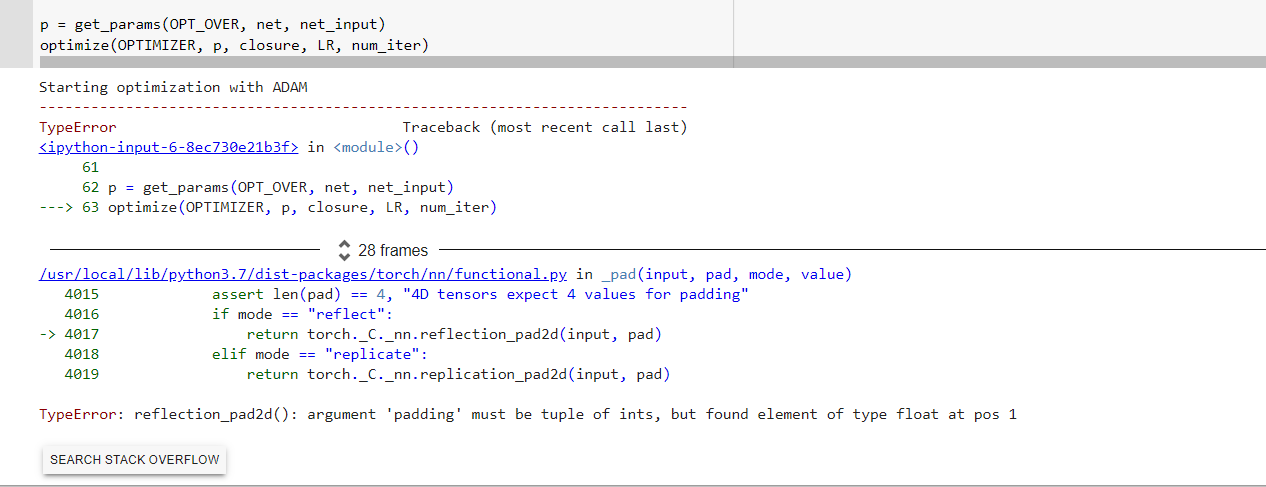I am trying to use Deep Image Prior for denoising image when i change the net to texture_nets i am having this error. need help
code:
!git clone https://github.com/DmitryUlyanov/deep-image-prior
!mv deep-image-prior/* ./
from __future__ import print_function
import matplotlib.pyplot as plt
%matplotlib inline
import os
#os.environ['CUDA_VISIBLE_DEVICES'] = '3'
import numpy as np
from models import *
import torch
import torch.optim
#evaluation metric
from skimage.measure import compare_psnr
from utils.denoising_utils import *
torch.backends.cudnn.enabled = True
torch.backends.cudnn.benchmark =True
dtype = torch.cuda.FloatTensor
imsize =-1
PLOT = True
sigma = 25
sigma_ = sigma/255.
fname = '/content/dog3.jpg' #load image
# Add synthetic noise
img_pil = crop_image(get_image(fname, imsize)[0], d=32)
img_np = pil_to_np(img_pil) #convert PIL Image to numpy array from w*h*c -> c*w*h
img_noisy_pil, img_noisy_np = get_noisy_image(img_np, sigma_) # adding noise to original image
if PLOT:
print('Original Image: ')
plot_image_grid([img_np], 1, 8);
print('\nNoised Image: ')
plot_image_grid([img_noisy_np], 1, 8);
INPUT = 'noise' # 'meshgrid' get_noise function
pad = 'reflection'
OPT_OVER = 'net' # 'net,input'
reg_noise_std = 1./30. # set to 1./20. for sigma=50
LR = 0.01
OPTIMIZER='adam' # 'LBFGS'
show_every = 100
exp_weight=0.99
num_iter = 1000
input_depth = 3
figsize = 4
net = get_net(input_depth, 'texture_nets', pad, upsample_mode='bilinear').type(dtype)
net_input = get_noise(input_depth, INPUT, (img_pil.size[1], img_pil.size[0])).type(dtype).detach()
# Compute number of parameters
s = sum([np.prod(list(p.size())) for p in net.parameters()]);
print ('Number of params: %d' % s)
# Loss
mse = torch.nn.MSELoss().type(dtype)
img_noisy_torch = np_to_torch(img_noisy_np).type(dtype)
net_input_saved = net_input.detach().clone()
noise = net_input.detach().clone()
out_avg = None
last_net = None
psrn_noisy_last = 0
loss = []
i = 0
def closure():
global i, out_avg, psrn_noisy_last, last_net, net_input, loss
if reg_noise_std > 0:
net_input = net_input_saved + (noise.normal_() * reg_noise_std) #changing the input to the netwok
out = net(net_input)
# Smoothing
if out_avg is None:
out_avg = out.detach()
else:
out_avg = out_avg * exp_weight + out.detach() * (1 - exp_weight) # calculating average network output
total_loss = mse(out, img_noisy_torch)
total_loss.backward()
loss.append(total_loss.item())
# caculating psrn
psrn_noisy = compare_psnr(img_noisy_np, out.detach().cpu().numpy()[0]) # comparing psnr for the output image and the actual noisy image
psrn_gt = compare_psnr(img_np, out.detach().cpu().numpy()[0]) # comparing psnr for the output image and the original image
psrn_gt_sm = compare_psnr(img_np, out_avg.detach().cpu().numpy()[0]) # comparing psnr for the output average and the original image
if PLOT and i % show_every == 0:
out_np = torch_to_np(out)
# plotting the output image along the average image calculated
print(f'\n\nAfter {i} iterations: ')
print ('Iteration %05d Loss %f PSNR_noisy: %f PSRN_gt: %f PSNR_gt_sm: %f' % (i, total_loss.item(), psrn_noisy, psrn_gt, psrn_gt_sm), '\r', end='\n')
plot_image_grid([np.clip(out_np, 0, 1),
np.clip(torch_to_np(out_avg), 0, 1)], factor=figsize, nrow=1)
# Backtracking
if i % show_every:
if psrn_noisy - psrn_noisy_last < -5:
print('Falling back to previous checkpoint.')
for new_param, net_param in zip(last_net, net.parameters()):
net_param.data.copy_(new_param.cuda())
return total_loss*0
else:
last_net = [x.detach().cpu() for x in net.parameters()]
psrn_noisy_last = psrn_noisy
i += 1
return total_loss
p = get_params(OPT_OVER, net, net_input)
optimize(OPTIMIZER, p, closure, LR, num_iter)
Starting optimization with ADAM
---------------------------------------------------------------------------
TypeError Traceback (most recent call last)
<ipython-input-6-8ec730e21b3f> in <module>()
61
62 p = get_params(OPT_OVER, net, net_input)
---> 63 optimize(OPTIMIZER, p, closure, LR, num_iter)
28 frames
/usr/local/lib/python3.7/dist-packages/torch/nn/functional.py in _pad(input, pad, mode, value)
4015 assert len(pad) == 4, "4D tensors expect 4 values for padding"
4016 if mode == "reflect":
-> 4017 return torch._C._nn.reflection_pad2d(input, pad)
4018 elif mode == "replicate":
4019 return torch._C._nn.replication_pad2d(input, pad)
TypeError: reflection_pad2d(): argument 'padding' must be tuple of ints, but found element of type float at pos 1
